A Ligature for Black Bodies
The 2020 Sexton Prize for Poetry Winner!
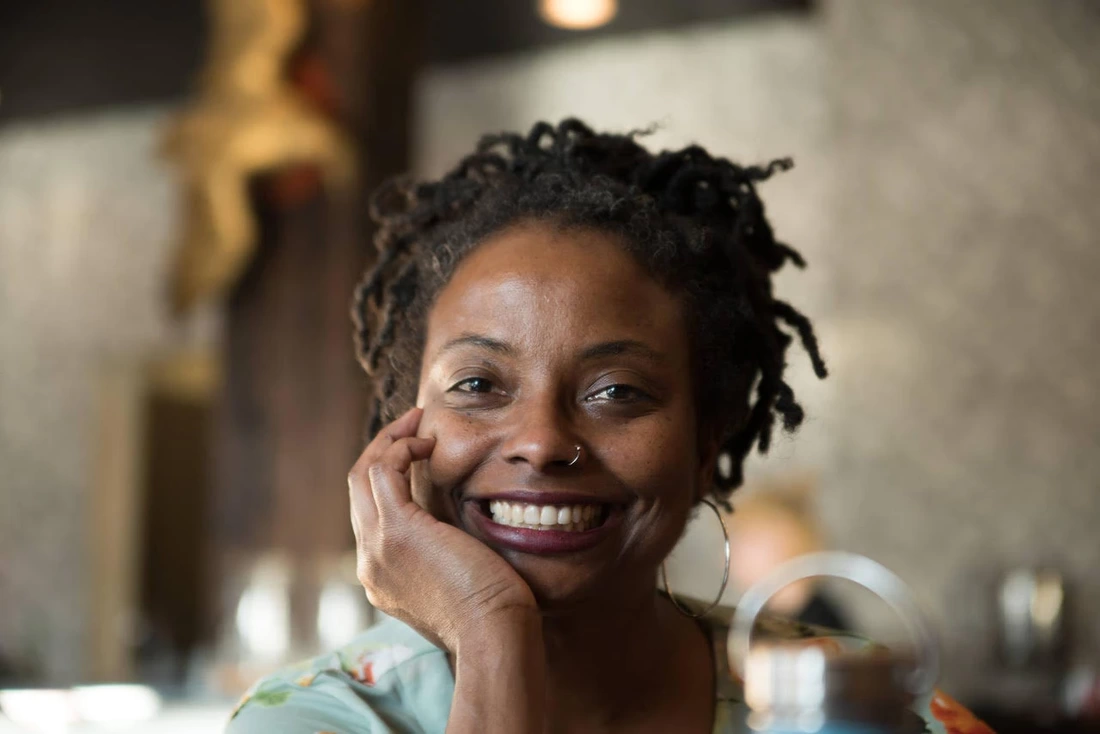
June 09, 2020
Thank you to all candidates who entered their poetry into this prize and thank you to our final judge Terese Svoboda for taking the time to dive into the hearts of these poets to give them the time and consideration they deserve. She read ALL the submissions fully and selected the shortlist also.
Our winner receives a prize of 2000 USD and publication in 2020; our runner-up wins 1000 USD and publication within 12 months. Both books will be distributed in the USA by SPD, in Canada by LitDistCo, and in the UK and Ireland by BookSource.
We are so pleased to announce our winner:
Denise Miller - A Ligature For Black Bodies
Denise Miller is a professor, poet and mixed media artist whose poetry has been published in the Offing, African American Review and Blackberry: A Magazine. They were named the 2015 Willow Books Emerging Poet, an AROHO Waves Discussion Fellowship awardee, a finalist for the Barbara Deming Money for Women Fund, and a Hedgebrook Fellow. Their work titled, Core, was released by Willow Books in 2015 and has since been nominated for a 2016 American Book Award and a 2016 Pushcart Prize. Miller has been named a 2016 William Randolph Hearst Fellow at the American Antiquarian Society. Their chapbook, Ligatures was published in 2016 by Rattle Press. Most recently, they have been awarded a 2020 Storyknife Residency and a 2020 Martha's Vineyard Institute of Creative Writing Fellowship. More of their work can be found at www.denisemiller.studio.
Denise Miller has made the following statement in acceptance of this prize:'I am honored to accept the 2020 Sexton Prize for Poetry. A Ligature for Black Bodies was written at a time when the only way that I could move through the violence that was happening on a soul level was to research and write about it -- to take it in as poison and put it out as medicine. That was the end of 2015 and the beginning of 2016. Now in 2020, the manuscript has been accepted at a moment that is, unfortunately, not unlike that one. What is different however about this time, is the commitment of more people in Europe and the United States to shine a light in dark places. Thank you to The Black Spring Press Group for being part of that group. Your acknowledgement of my manuscript and its coming publication through this award affords me the opportunity to write and disseminate widely poetry that matters.'
Our final judge's comments on choosing this winner:'I read Denise Miller's Ligature for Black Bodies months before the Black Lives Matter protests erupted in the US. With the noose as a framing device, the book exerts the force of witness, from “born brown then picnic blackened” to its last chilling sentence: “He was breathing.” Its eerie timeliness is striking, though sadly not prescient, since the issue of racial disparity has ground on with an unbearable cyclical quality for centuries. Police cams recordings and the self-incriminating testimony of the killers of so many innocent black Americans burn through the centre of the book, clear evidence of the urgent need for social justice. Even the media's culpability is noted, even the reader's, who cannot turns the pages without being a voyeur to such terrors, as if viewing the racist postcards still sold by white supremacists today. For the most part wrought out of found material interrogated by audacious yet formally expert poems, Ligature for Black Bodies portends and portends.'
Storyknife Writers Retreat Residency
Awardee Fall 2020
Storyknife Writers Retreat, located in Homer, Alaska, hosts residencies for women from Alaska, across the United States, and internationally, to give women writers the time and space to explore their craft without distraction. Women’s voices are powerful and necessary. Storyknife Writers Retreat has been established to foster those voices, to provide women a supportive community and the time and space to devote to writing, and to lend cultural weight to women’s writing.
Martha's Vineyard Institute of Creative Writing 2020 Poet-Author Fellowship Awardee
The Martha’s Vineyard Institute of Creative Writing was founded to enrich the lives of writers by fostering creativity, community, and craft among established authors and poets. Our goal is to make the writing program experience a personal one that aides in building a writing community through friendships and artistic connections with other writers. The Institute is also committed to enhancing the literary landscape of Martha’s Vineyard for residents and visitors through our public reading series, writing seminars, and annual Summer Writers’ Conference.
Each summer, we offer two comprehensive week-long seminars at our Writers’ Conference, providing writers with the necessary time to devote to their art in the idyllic setting of the island of Martha's Vineyard. Participants include individuals of varying ages and abilities, from published writers to skilled beginners. We invite award-winning authors and poets, literary journal editors, and university creative writing faculty from around the country to lead writing seminars, work one-on-one with attendees in individualized editing sessions, and provide the necessary tips and tools for editing and publishing. We also offer the opportunity to engage with Visiting Writers outside of seminars during our public evening readings and receptions, as well as a panel discussion on the craft of writing, offering a more intimate experience than most summer writing programs.
To Reclaim Humanness Project
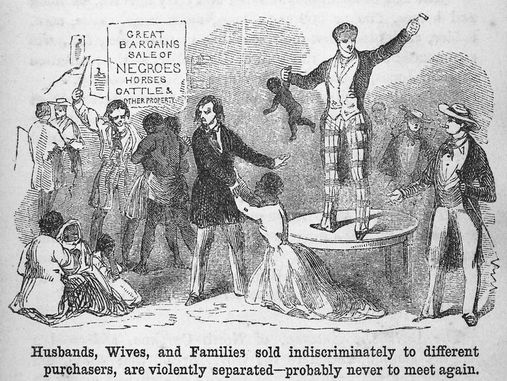
To Reclaim Humanness: the Forced Heroism of African American Women and their Struggle to Be Human
(excerpt) In the current discourse about African Americans considering police brutality, many of us find ourselves using the words “black bodies” to describe black people. Although this language clearly reflects the physicality of the overwhelming numbers of black people we see felled by police bullets yearly, monthly, weekly and even daily in this country, this seemingly benign act of separating body from breath or body from spirit is a revelatory reminder of the mind/body problem African Americans have been historically forced to reckon with since the first enslaved “negroes” were brought to Massachusetts in 1624. From these beginnings, a white power structure has always sought to make bodies out of black people and because of a racially rooted power structure set up to create and perpetuate racism, we black people have much too often had to reclaim these bodies that have been systematically stripped of breath. Our current striving in this country to convince that same power structure that black lives matter, will not keep black bodies from falling until we convince this same white power structure that we are black people and that the same animating principles that make them human are the same animating principles that make us human.
Historically, African Americans have made countless discoursive attempts to place ourselves in a family of humans as evidenced by Sojourner Truth’s asking the rhetorical question “Ain’t I a woman” in her speech posthumously titled the same and given at the Women’s Convention, Akron, Ohio, 28-29 May 1851 or Frederick Douglass’ “To My Old Master, Thomas Auld” in 1855 where he states to his former master “I am myself; you are yourself; we are two distinct persons, equal persons… You are a man, and so am I. God created both, and made us separate beings. I am not by nature bond to you, or you to me… I am your fellow-man, but not your slave”. However, the audience for these assertions so often attempted at the same time to erase black people’s humanness.
(excerpt) In the current discourse about African Americans considering police brutality, many of us find ourselves using the words “black bodies” to describe black people. Although this language clearly reflects the physicality of the overwhelming numbers of black people we see felled by police bullets yearly, monthly, weekly and even daily in this country, this seemingly benign act of separating body from breath or body from spirit is a revelatory reminder of the mind/body problem African Americans have been historically forced to reckon with since the first enslaved “negroes” were brought to Massachusetts in 1624. From these beginnings, a white power structure has always sought to make bodies out of black people and because of a racially rooted power structure set up to create and perpetuate racism, we black people have much too often had to reclaim these bodies that have been systematically stripped of breath. Our current striving in this country to convince that same power structure that black lives matter, will not keep black bodies from falling until we convince this same white power structure that we are black people and that the same animating principles that make them human are the same animating principles that make us human.
Historically, African Americans have made countless discoursive attempts to place ourselves in a family of humans as evidenced by Sojourner Truth’s asking the rhetorical question “Ain’t I a woman” in her speech posthumously titled the same and given at the Women’s Convention, Akron, Ohio, 28-29 May 1851 or Frederick Douglass’ “To My Old Master, Thomas Auld” in 1855 where he states to his former master “I am myself; you are yourself; we are two distinct persons, equal persons… You are a man, and so am I. God created both, and made us separate beings. I am not by nature bond to you, or you to me… I am your fellow-man, but not your slave”. However, the audience for these assertions so often attempted at the same time to erase black people’s humanness.
Ligatures - 2nd place winner of the 2016 Rattle Chapbook Contest
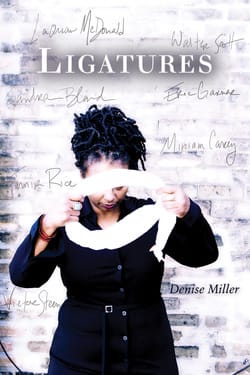
Ligatures, a 2nd place winner of the 2016 Rattle Chapbook Contest is a collection of poems that explore what it means to see the felling of black and brown people through the dash cams and body cams of the police officers that shoot them. It also seeks to highlight the ways in which these videos from police body cams and dash cams mirrors the taking of pictures and the sending of lynching postcards.
The viewing of the dying and dead bodies of African Americans made lifeless while surrounded by spectators is one of the driving forces or the manuscript. The persona poems offer the perspectives of the officers who ended the life of each of the African Americans in the poems. In order to write these poems, I scoured the news reports to find any explanations of their actions from their own mouths or the mouths of their lawyers. The framing poems are a narrator who reminds the viewer of the role they play and what they will encounter as the "view". There are also primary documents before each poem that tell the reader the media's take on each of the incidents.
Ligatures is out from Rattle Press. Please purchase a signed copy here or an unsigned one here at Rattle.
The viewing of the dying and dead bodies of African Americans made lifeless while surrounded by spectators is one of the driving forces or the manuscript. The persona poems offer the perspectives of the officers who ended the life of each of the African Americans in the poems. In order to write these poems, I scoured the news reports to find any explanations of their actions from their own mouths or the mouths of their lawyers. The framing poems are a narrator who reminds the viewer of the role they play and what they will encounter as the "view". There are also primary documents before each poem that tell the reader the media's take on each of the incidents.
Ligatures is out from Rattle Press. Please purchase a signed copy here or an unsigned one here at Rattle.
Core - a 2014 Finalist for The Willow Books Literature Awards
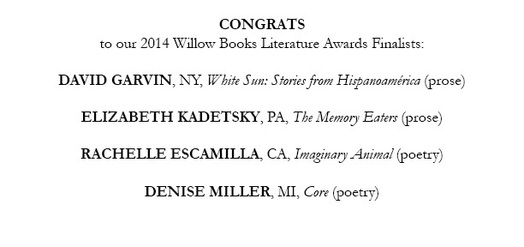
2014 Finalist for The Willow Books Literature Awards recognize literary excellence in prose and poetry by writers from culturally diverse backgrounds.
Hedgebrook 2014 Writers in Residence Award
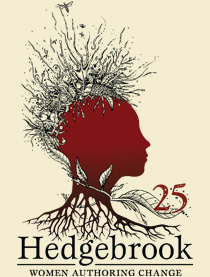
2014 Writers in Residence Award
Hedgebrook retreat for women writers is on Whidbey Island, about thirty-five miles northwest of Seattle. Situated on 48-acres of forest and meadow facing Puget Sound, with a view of Mount Rainier, the retreat hosts women writers from all over the world for residencies of two to six weeks, at no cost to the writer. Residents are housed in six handcrafted cottages, where they spend their days in solitude – writing, reading, taking walks in the woods on the property or on nearby Double Bluff beach. In the evenings, they gather in the farmhouse kitchen to share a home-cooked gourmet meal, their work, their process and their stories. The Writers in Residence Program is Hedgebrook’s core program, supporting the fully-funded residencies of approximately 40 women writers at the retreat each year.
Hedgebrook retreat for women writers is on Whidbey Island, about thirty-five miles northwest of Seattle. Situated on 48-acres of forest and meadow facing Puget Sound, with a view of Mount Rainier, the retreat hosts women writers from all over the world for residencies of two to six weeks, at no cost to the writer. Residents are housed in six handcrafted cottages, where they spend their days in solitude – writing, reading, taking walks in the woods on the property or on nearby Double Bluff beach. In the evenings, they gather in the farmhouse kitchen to share a home-cooked gourmet meal, their work, their process and their stories. The Writers in Residence Program is Hedgebrook’s core program, supporting the fully-funded residencies of approximately 40 women writers at the retreat each year.